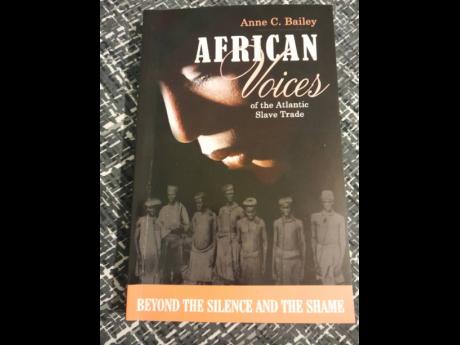Anne C. Bailey shattering the silence, vanquishing the shame
FOR 300 years Europeans transported West Africans to the West Indies to work on plantations under the inhuman system of chattel slavery, the narratives of which is told mainly by the Europeans themselves.
The voices of the Africans – the ones who were forcibly taken across the Atlantic in overcrowded barracoons, the ones who were complicit in the capture and sale of their own kinds, and those who were affected by the loss of their family, relatives, friends and associates – are silent.
The silence is inspired, perhaps, by the shame of the roles the African themselves played in the perpetuation of the “largest involuntary movement of persons in recorded history”, “the forced transportation of 15 million people across the Atlantic”.
“It ended during the last quarter of 19th century, but has left behind an emotionally charged legacy that drives a shame and guilt cycle that continues to shackle minds and inhibits discourse,” Hilary Mcd. Beckles writes in the forward of Anne C. Bailey’s book, A frican Voices of the Atlantic Slave Trade – Beyond the Silence and the Shame, published by Ian Randle Publishers.
“Anne Bailey’s book is a timely and excellent contribution to this slowly evolving scientific inquiring that seeks to reveal world-long hidden, buried maybe within African souls … It is an insider’s narrative skilfully woven and sensitively written with the empathy of a fine scholar whose sense of responsibility to subject and society is much maturely displayed,” Beckles says.
“In this seminal work, historian Anne Bailey focuses on memories of the trade from the African perspective. African chiefs and other elders from the area of the former old slave coast of southeastern Ghana, share stories that reveal that Africans were traders, as well as victims of the trade,” the publishers say.
“Bailey breaks the deafening silence and explores the delicate and fragmented nature of historical memory in this unprecedented and revelatory book which is bound to spark discussion and debates especially during the 2007 bicentenary of the legislative abolition of the trade in British territories.”
This 264-page glossy paperback has eight chapters, viz, From The Middle Passage To Middle Quarters, Jamaica - The Transformation of a Personal Journey; The Incident at Atorkor - A Break with the Past; African Agency in the Atlantic Slave Trade - Realities and Perceptions; African Resistance - The Slave who Whipt Mistress and Ganed her Freedom and Other Oral and Written Tales.
In chapter one, Bailey writes, “Here and on the other side of the Atlantic, in fact wherever people of African descent are to be found, there is a deafening silence on the subject of slavery and the Atlantic slave trade. All that remains are fragments which, like scattered pieces of a broken vase, do not represent the whole. Under the silence are palpable sighs of regret, pain, sorrow, guilt and shame.
“Growing up in Jamaica, I was engulfed by this silence. Slavery and the slave trade were not exactly taboo subjects, but they were not subjects that many Jamaicans readily discussed … In writing this book, I have been inspired by both personal and professional stories that linger along the contours of my own family history and our collective memory.”
Chapter two, “in many ways, the central chapter of the book”, looks “at the main oral historical account in this collection, which is also the one with more documentary evidence”. It is about an incident at Atorkor in 1856 in which traders in Africans had kidnapped respected drummers, relatives of Chief Ndorkutsu, before his very eyes. He himself was a trader in Africans for decades.
“The incident caused storms within and without the Ewe community because it was an established norm that slaves came from the interior, not the coast. This is the primary reason that this single incident is still remembered today all over the Volta region and wherever Anlo Ewe of Ghana now reside although so many others have been forgotten.
The other chapters are: European and American Agency in the Atlantic Slave Trade – From Raid and Trade to Operational Breakdown; The Social and Political Impact of the Atlantic Slave Trade on the Old Slave Coast; Subversion of the Sacred – The Effects of the Atlantic Slave Trade on Anlou Ewe Religious Organizations; and Reparation as Rememory and Redress.
Bailey ends the final chapter and the book with: “In the end, beyond the silence and the shame, may this a tragic period of history be remembered for the purpose of honouring those who did not survive it and addressing the problems and the challenges faced by those who did.” She has long broken her silence. It’s time for people to listen, time for African voices to be heard, time to get this very informative and interesting book.

